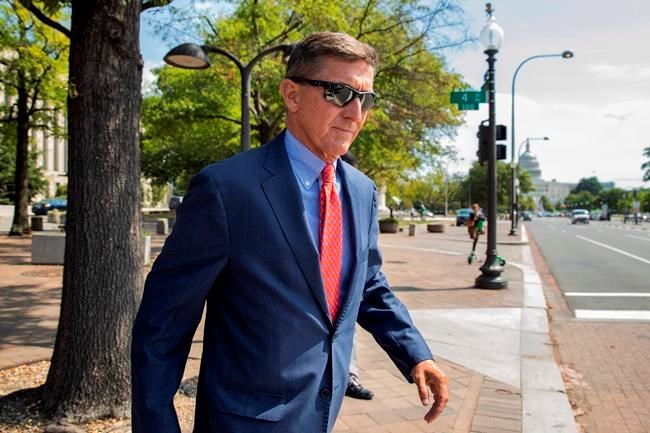WASHINGTON — A lawyer for former Trump administration national security adviser Michael Flynn told a judge Tuesday that she recently updated President Donald Trump on the case and asked him not to issue a pardon for her client.
The attorney, Sidney Powell, was initially reluctant to discuss her conversations with the president or the White House, saying she believed they were protected by executive privilege. But under persistent questioning from U.S. District Judge Emmet Sullivan, she acknowledged having spoken to the president within the last few weeks to update him and to request that he not pardon Flynn.
She did not elaborate on the request, but it presumably reflected the
That request is pending, with Sullivan not immediately ruling one way or the other on Tuesday.
Powell's acknowledgement that she had recently spoken with the president about the case that arose from special counsel Robert Mueller’s Russia probe underscored the politically charged nature of the prosecution. Flynn has emerged as something of a cause célèbre for Trump supporters, while critics of Barr’s action — including former FBI and Justice Department officials — have decried what they see as the politicization of law enforcement in the move to drop the case.
Current Justice Department officials vigorously rejected that characterization at Tuesday's hearing, the first since a federal appeals court ruled last month that Sullivan did not have to immediately dismiss the prosecution just because the government wants him to. That decision returned the case to Sullivan for additional proceedings.
At issue before the judge Tuesday was what role courts may play in scrutinizing prosecutors' request to abandon a case they had once brought, and to what extent a judge can second-guess the motives behind such an effort.
Flynn has twice pleaded guilty to lying to the FBI about a conversation with the Russian ambassador during the presidential transition period in December 2016, when he encouraged the diplomat not to escalate tensions over sanctions that had just been imposed by the Obama administration for election interference. At the time, the FBI was investigating whether the Trump campaign had
But the Justice Department moved in May to dismiss the case, saying there had been insufficient basis to interview Flynn and that the questioning of Flynn and the statements he made were not relevant to the FBI's broader counterintelligence investigation into the campaign and Russia.
Powell, Flynn's attorney, added her own criticism, calling the case and the way it was handled a “hideous abuse of power that continues until this very minute.”
“This is the most egregious injustice I have ever seen in my 30-plus years of practice,” Powell said.
Sullivan has so far resisted efforts to dismiss the prosecution and appointed a former federal judge to argue against the Justice Department's position. That ex-judge, John Gleeson, has accused the department of acting for political reasons when it moved to drop the case and of shifting its rationale over several months for doing so.
“These reasons are so patently pretextual that the government feels the need to keep coming up with more of them,” Gleeson said.
Lawyers for the federal government revived their efforts to persuade Sullivan that dismissing the Flynn case was in the interests of justice. The lawyers cited what they said was internal uncertainty within the FBI about whether Flynn had even committed a crime, as well as questions about the credibility of law enforcement officials in the case.
Allegations of improper political motives are “just not true,” said federal prosecutor Ken Kohl, who identified himself as the most senior career official in the U.S. Attorney's office in Washington.
“I've never seen it in my career in (this) office, and it didn’t happen here,” Kohl said. “I’m here to say that the U.S. Attorney's office's decision to dismiss this case was the right call for the right reasons.”
He also suggested that the case would be impossible for the Justice Department to prove beyond a reasonable a doubt because of credibility issues involving witnesses. He cited the actions of Peter Strzok, an FBI agent who interviewed Flynn but was later fired from the bureau because of pejorative texts about Trump, and former FBI Deputy Director Andrew McCabe, who was fired amid allegations that he misled the Justice Department's inspector general over a news media disclosure.
“Are we going to call Pete Strzok in this case?” Kohl asked rhetorically. “Or do we call the deputy director who ordered the interview, Andy McCabe?”
A spokeswoman for McCabe declined to comment, as did a lawyer for Strzok.
In recent weeks, as part of the review of the Flynn case being conducted by U.S. Attorney Jeffrey Jensen of St. Louis, the Justice Department has identified correspondence that it regards as possibly
That includes the recent interview of an FBI agent who was part of the Russia investigation and had expressed misgivings about the Flynn case, and had also come to believe that some on the Mueller team exhibited a “get Trump” attitude.
___
Follow Eric Tucker on http://www.twitter.com/etuckerAP
Eric Tucker, The Associated Press



